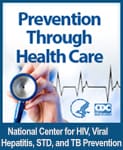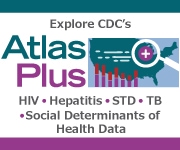CDC awards $55 million for HIV prevention among gay, bisexual and transgender youth of color
Press Release
For immediate release: September 27, 2011
Media Contact: NCHHSTP – News Media Line, +1-404-639-8895, NCHHSTPMediaTeam@cdc.gov
The Centers for Disease Control and Prevention today awarded $55 million over five years to 34 community-based organizations (CBOs) to expand HIV prevention services for young gay and bisexual men of color, transgender youth of color, and their partners. The awards expand upon a previous program to reach these populations with an increase of $10 million to fund a larger number of community organizations. The average award for each organization is approximately $300,000 per year.
“On this National Gay Men’s HIV/AIDS Awareness Day, we are reminded of the urgency of the HIV epidemic in the United States and the dramatic impact among gay and bisexual men, who account for more than 60 percent of new infections,” said Dr. Jonathan Mermin, director of CDC’s Division of HIV/AIDS Prevention. “We must also recognize that the epidemic cannot be overcome without effectively addressing the severe and rising toll of HIV infections among gay and bisexual men of color, who continue to be hardest hit by this disease.”
Recent data show that young men who have sex with men (MSM) of color are at particularly high and increasing risk of HIV infection. According to CDC estimates released in August, between 2006 and 2009, the annual number of new HIV infections increased 48 percent among young black MSM. Among Latinos, men who have sex with men are by far the most severely impacted, accounting for nearly two-thirds of all new infections. Nearly half of these infections among Latino MSM occurred in the youngest age group (aged 13-29). Transgender people are also severely affected by HIV. It is estimated that 28 percent of transgender people are HIV-infected.
The new CDC awards are designed to enable CBOs with strong links to these populations to meet their specific HIV prevention needs. As part of these awards, each organization will be required to provide specific prevention services. These include providing HIV testing to a total of more than 90,000 young gay and bisexual men and transgender youth of color, with a goal of identifying more than 3,500 previously unrecognized HIV infections (over the five-year funding period) – and linking those who are HIV-infected to care and prevention services. CBOs will also carry out proven behavioral change HIV prevention programs and distribute condoms to young gay and bisexual men and transgender youth of color who are at high risk for HIV or are HIV-infected.
The 34 funded CBOs represent 19 states and Puerto Rico. Thirty organizations will receive funding for efforts reaching young gay and bisexual men of color, and six will receive funding for efforts reaching transgender youth of color (two organizations are funded to reach both populations). A complete list of organizations receiving funding is provided below.
Geographic distribution of the awards is aligned with the AIDS burden among MSM of color in the United States. For example, 44 percent of the funds will go to CBOs in the South, where 42 percent of AIDS diagnoses among MSM of color occurred in 2008.
The new awards are one part of CDC’s efforts to reduce HIV infections among young MSM and transgender youth of color and supports President Obama’s National HIV/AIDS Strategy which calls for prioritizing prevention efforts for the most-affected populations.
CDC also works to develop tailored prevention programs designed to change HIV risk behaviors, empower individuals to protect themselves from infection, increase diagnoses of HIV, and support HIV prevention and treatment services. CDC supports the implementation of these programs with technical assistance and funding for health departments and CBOs. In addition, later this year, CDC will roll-out a new phase of its HIV testing campaign for black gay and bisexual men with intensive local campaigns in select cities, accompanied by national internet advertising and social media outreach. The campaign, called Testing Makes Us Stronger, is a part of CDC’s five-year, multi-faceted national communication campaign, Act Against AIDS.
For more information, please visit https://www.cdc.gov/hiv.
***
Organizations Funded Under CDC’s New Awards:
- Abounding Prosperity, Dallas
- AID Atlanta Inc.
- AIDS Alabama, Birmingham
- AIDS Project of the East Bay, Oakland, Calif.
- AIDS Service Center of Lower Manhattan, New York City
- AltaMed Health Services Corporation, Los Angeles
- Asian Pacific Islander Coalition, New York City
- Bronx AIDS Services, New York City
- Brooklyn AIDS Task Force, New York City
- CANDII, Inc., Norfolk, Va.
- Care Resource, Miami
- Center of Halsted (Horizon Community Services), Chicago
- Columbus AIDS Task Force, Columbus, Ohio
- Community Health Awareness Group, Detroit
- Community Health Project, New York City
- Diverse and Resilient, Inc., Milwaukee
- Family Health Centers of San Diego, Inc.
- Foundation for Research on Sexually Transmitted Diseases, New York City
- Houston Area Community Services, Inc.
- Hyacinth AIDS Foundation, New Brunswick, N.J.
- Kansas City Free Health Clinic, Kansas City, Mo.
- La Clinica De La Raza, Inc., Oakland, Calif.
- La Clinica Del Pueblo, Inc., Washington, D.C.
- L.A. Gay & Lesbian Center, Los Angeles
- Legacy Community Health Services, Houston
- Lester and Rosalie Anixter Center, Chicago
- My Brother’s Keeper Inc., Ridgeland, Miss.
- New Orleans AIDS Taskforce
- Philadelphia Fight
- Positive Impact, Inc., Atlanta
- Puerto Rico CoNCRA, San Juan
- South Carolina HIV/AIDS Council, Columbia
- Us Helping US, People Into Living, Inc., Washington, D.C.
- Women Accepting Responsibility, Baltimore
###

